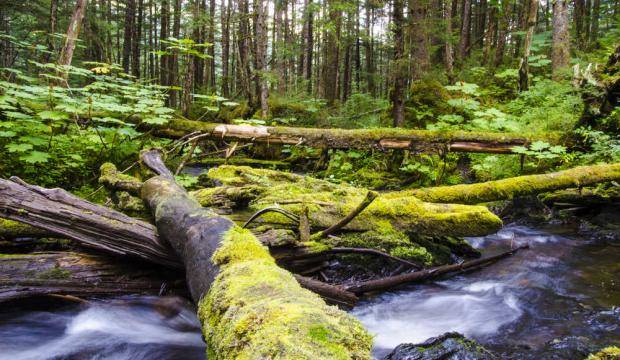Correction: This article initially listed an incorrect figure for the number of acres the roadless rule would apply to in the Tongass National Forest. The article has been updated with the correct figure.
After visiting timber industry sites in Southeast Alaska on Thursday, U.S. Department of Agriculture Secretary Sonny Perdue said he’d like to alter federal law to allow more logging in the Tongass National Forest.
Perdue, the highest ranking official at the agency overseeing the U.S. Forest Service, toured logging companies and two timber stands on Thursday at the invitation of U.S. Sen. Lisa Murkowski. He told reporters afterward he hopes to develop an “Alaska-specific” version of the 2001 roadless rule, which bans logging and road building on national forest lands where roads have not been built. The rule applies to 9.6 million acres (57 percent) of the Tongass.
The State of Alaska has tried for years to secure an exemption to the rule in federal courts. The U.S. District Court of the District of Columbia shot down those efforts last year.
Perdue said he’d like to take a different tack: working with the state and the USDA to alter the rule, giving Alaska more control over what lands it logs.
“We believe that the best way to resolve and dissolve the concerns of Southeast Alaska with regard to Tongass, and all the things it affords and the multiple uses there, is to use an exemption for a state-specific, Alaska state roadless rule,” he said.
While logging has waned to a fraction of what it once 20 or 30 years ago, other industries like commercial fishing and tourism have remained steady or expanded. With the shuttering of Southeast’s mills, large USFS timber sales now have a hard time finding buyers.
The Tongass should be a “working forest” for all industries, Perdue said, and timber should have a larger place in Southeast’s forest economy.
“Healthy forests produce health in many ways, for humans, for wildlife, for fishing, for water quality and for beauty. Actually, we see this in many places. This is Senator Murkowski’s desire as well,” he said.
Tour operators are concerned a timber revival could harm those industries. But Perdue said logging and other industries are “not mutually-exclusive.” While his goal is not return the “logging days of old,” Perdue said he wants the USFS to support a “base layer” of logging in the region.
Murkowski, Gov. Bill Walker and Alaska’s congressional delegation have all spoken out against the roadless rule.
• Contact reporter Kevin Gullufsen at 523-2228 and kgullufsen@juneauempire.com. Follow him on Twitter at @KevinGullufsen.

